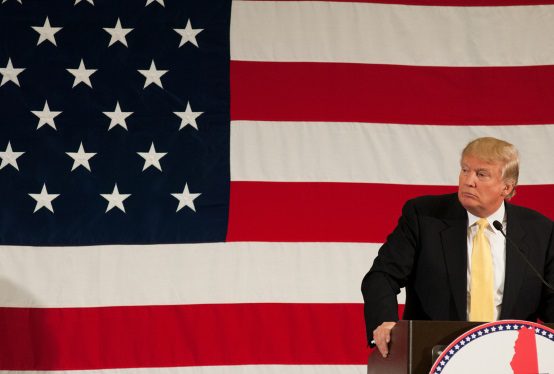No, Trump Isn’t an “Isolationist”

Shikha Dalmia labels Trump an “isolationist”:
Hence, Trump’s radically isolationist ideology — seeing the world not as a place full of opportunities waiting to be harnessed but a giant rip-off — resonates with them. His vow to “Make America Great Again” by nixing America’s overseas commitments, slashing trade, and ejecting welfare-mooching foreigners makes perfect sense to many conservatives.
There is no word more misleading in our foreign policy debates than “isolationist.” It almost never applies to the person it is being used to describe, and there is always a better term that could be used in its place. In Trump’s case, what Dalmia casts as “radically isolationist ideology” is just a variant of a pugnacious American nationalism. Colin Dueck sees Trump this way, and for once I am in at least partial agreement with Dueck. Dueck writes:
His critics call him an isolationist, but that’s not quite right either. Genuine isolationists on both left and right, however wrong-headed, tend to be more high-minded, principled and pristine than The Donald. Trump’s real niche, carved out in his own strange way, is simply American nationalism.
My main objection to this is that Dueck refers to “genuine isolationists” today as if such people existed, when that simply isn’t true. If we assume that Dueck is wrongly labeling non-interventionists as “isolationists,” the statement makes a bit more sense.
It is always perilous to identify Trump with any particular tradition because he so often seems to be making things up as he goes along and won’t be pinned down by his current or past positions, but insofar as we can define Trump’s campaign themes it makes sense to think of him as the candidate espousing the most vocal and sometimes most obnoxious nationalist position. If he were an “isolationist,” he wouldn’t be looking for ways to “beat” other states, but would be concerned with separating the U.S. from them as much as possible.
Trump’s nationalism leads him on the one hand to eschew deeper involvement in Syria because the conflict has little or nothing to do with the U.S., but on the other it leads him to make ridiculous statements about seizing other nations’ resources and denouncing diplomatic agreements with other states. If we can pin down his foreign policy at all, it is aggressive and unilateralist when Trump thinks the U.S. has something to gain, and it is otherwise content to leave regional problems to regional actors. One reason that he isn’t an “isolationist” or anything close to it is that he claims to want to “make America great again,” and part and parcel of that supposed greatness is building up the military and “winning” contests with other states. He objects to subsidizing free-riding wealthy allies, but as far as I know he has never suggested reneging on any treaty commitments to European or Asian allies, and he frames his opposition to the nuclear deal at least in part in terms of supporting Israel.